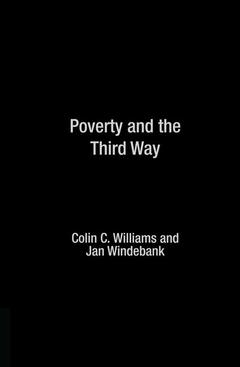Description
Poverty and the Third Way
Routledge Studies in Human Geography Series
Coordinators: Williams Colin C, Williams Colin C.
Language: English
Subject for Poverty and the Third Way:
Keywords
Informal Work; informal; Informal Sphere; work; Jobless Households; formal; Informal Economic Activity; labour; Tax Credit; market; Civil Society; sphere; Formal Labour Market; economic; Post-war; activity; Unconditional Basic Income; time; Mutual Aid; bank; Facilitate Skill Acquisition; Conventional Employment; Multiple Earner Households; North; Time Banks; Lower Income Urban Neighbourhoods; Employee Mutual; Urban Rural Variations; Employment Participation Rates; Social Democratic Nations; UK Government Department; Southampton Households; European Commission 2000a; Southampton; European Commission 1996b
Publication date: 06-2015
· 15.6x23.4 cm · Paperback
Publication date: 11-2002
· 15.6x23.4 cm · Hardback
Description
/li>Contents
/li>Biography
/li>
What is poverty and how can it be tackled? Taking the Third Way out of its narrow party political context, this book argues that it is necessary to harness work beyond employment in order to pave a Third Way beyond capitalism and socialism. The outcome is a thought-provoking new approach towards combating poverty.
Poverty and the Third Way uncovers how New Labour's employment-focussed approach causes, rather than resolves, poverty. Searching for another approach, the authors find the seeds of an alternative 'Third Way' in radical European social democratic and ecological thought which seeks to transcend capitalism and socialism by developing work beyond employment. Exploring the reasons why such an approach is needed and how it can be implemented, the authors transcend the 'there is no alternative' to capitalism school of thought dominant in many advanced economies by providing a clearly marked route map of the way towards a post-capitalist economy.
1. Introduction
Part I Rationales for a Third Way Approach
2. The Problem of Full-Employment
3. The Informalisation of the Advanced Economies
4. Discourses on Informal Work and Their Implications
Part II Examining Poverty: Household Coping Capabilities and Practices
5. Coping Capabilities
6. Coping Practices
7. Developing Household Coping Capabilites: Problems and Prospects
Part III Tackling Poverty: A Third Way Approach
8. Towards a 'Civil-ised' Society: from Full-Employment to 'Full-Engagement'
9. The New Mutualism: a Fourth Sector Approached
10. The 'Working Citizen': Top-Down Initiatives
11. Conclusions
Colin C. Williams is reader in Economic Geography at the University of Leicester.
Jan Windebank is Senior Lecturer in French Studies and Associate Fellow of the Political Economy Research Centre (PERC) at the University of Sheffield.

